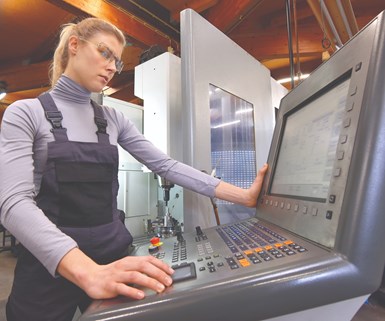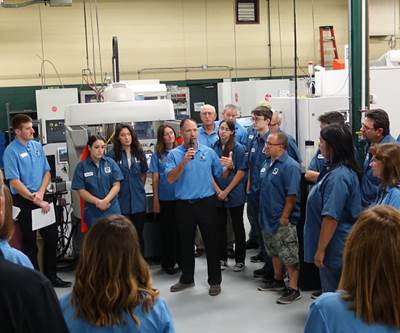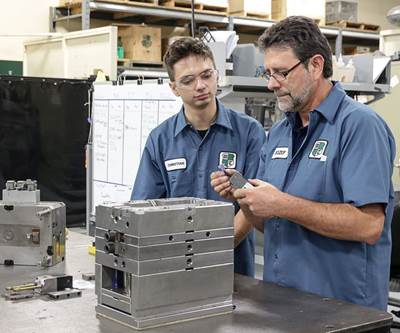Machining: Trade or Technology?
The answer has to do with how people view the job. Maybe reframing machining as a technology could better reflect the exciting progress the trade has made over the decades.
Share



Is machining a trade or a technology? This question keeps rearing its head for me. It stems from the work that I have been doing at the high school level, and I am tired of sitting on the fence about the answer to it.

For years we been calling machining a trade. A trade is a skill, and you learn a skill through on-the-job or classroom training. It is something that I associate with repetitive work. By that, I mean it is the way we do things today, and the way we will do them for the foreseeable future. I guess that held true for machining at the beginning of the industrial revolution, but that is no longer true today. This may not be the case for all machine shops, but I believe that machining has graduated from a trade to a technology.
A quick Google search for the definition of “technology” yielded the following: “The application of scientific knowledge for practical purposes, especially in industry.”
The machining industry has been rapidly expanding in scientific knowledge for a long time. Advanced materials, tooling and equipment are being used to make components. One can take implants in the medical field as merely one noteworthy example, including the use of advanced computers to create five-axis tool paths or models through sophisticated scanning. This is being done by machinists who have specialized. Can you call them tradespeople anymore?
The machinist of today is a computer programmer, a metallurgist, a process improver, a quality control technician and much more. I bet you can think of dozens more skills that many machinists must have in today’s industry. This is not just about cutting metal anymore. Machinists of today need to have more than one skill. I believe that the machinist of yesteryear is now called an operator in most shops.
The reason I am going through the struggle of figuring out the answer to the question above has to do with the connotations of the terms involved. Most people who think of machining as a trade also believe that being a machinist is to have a second-class job. If you cannot make it to Rocket Science School, your fallback is a trade. That really bothers me in light of what I have said about the transformation of machining and the machinist. Machining and machinists ride the crest of the technological wave. As I see it, this field is advancing faster than other fields and is becoming somewhat immune from technological disruption precisely because it is in the forefront.
I can see many highly coveted jobs being disrupted in the coming years. Many doctors may be replaced by artificial intelligence. Can you imagine an AI replacing engineers by being able to design things like buildings more quickly and accurately than their human counterparts?
I really believe that machining is going through a renaissance right now. It is becoming a very important field. It is not a second-class job. It is a very important job that is using advanced technology to make things. It is no longer simply the cutting of metal. Yes, we do cut metal; but with a lot of science and technology behind it. I am hoping that the parents of today will begin to see this and encourage their young people to become machinists instead of discouraging them. The future in our industry is becoming brighter and brighter. With more people entering our field, the manufacturing industry will flourish. The jobs that it will create will be well-paying and ever-changing, which will keep them very interesting.
In my opinion, machining is one of the best careers of the future. It has stepped away from being a trade and has become a wonderful technology.
Related Content
Preserve the Craft of Manufacturing as Technology Advances
As the industry continues to move toward a digital future, be sure to reinforce the core fundamentals right alongside it.
Read MoreFinding the Human Connections in Human Resources
By working with its employees and its community, Win-Tech has found unexpected opportunities for employee retention and recruitment.
Read MoreHow I Made It: Trevor Hirschi, Instructor, Bridgerland Technical College
Student, operator, instructor, shop owner — Trevor Hirschi’s many roles have enabled him to understand both the technical and creative sides of manufacturing.
Read MoreHow I Made It: Nushrat Ahmed: CNC Swiss Operator
By day, 21-year-old Nushrat Ahmed is a CNC Swiss operator making automotive parts. By night, she handcrafts crocheted items.
Read MoreRead Next
For This Mold Shop, the Key to Closing the Skills Gap is Emotional Intelligence
Thanks to a culture change founded on a commitment to emotional intelligence, this mold supplier solved its skilled labor problem and increased throughput per employee.
Read MoreIs Gen Z the Answer to the Skills Gap?
There are signs this generation could be. But it might take effort on your part presenting your shop’s capabilities and career opportunities in different ways.
Read More


























